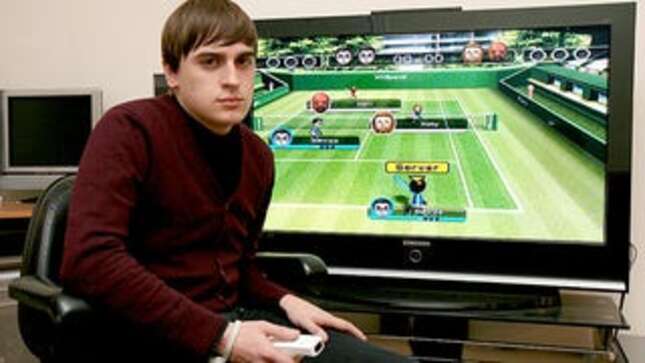BROOKLYN, NY—Nearly 50 percent of 26-year-old paralegal Philip Jenkins' encoded long-term memories involve button combinations, game-playing experiences, and spatial-cognitive maps of various levels and worlds from Nintendo's line of video-game consoles, a team of neuroscientists reported Tuesday.
The memory-evaluation study, headed by Dr. Franklin McCarroll of New York University's School of Psychology, revealed that approximately 47 percent of Jenkins' hippocampus is dedicated to storing notable video-game victories and frustrating last-minute defeats, while 32 percent of his amygdala contains embedded neurological scripts pertaining to game strategies, character back stories, theme songs, and cheat codes. In addition, his entire dorsolateral prefrontal cortex is devoted to remembering the time he did a helicopter dunk from half-court with Shawn Kemp at the buzzer to beat the Charlotte Hornets 82-81 in NBA Jam: Tournament Edition.

Although these percentages are only slightly above the average for males in Jenkins' age bracket, McCarroll said that the memories most closely associated with the interactive gaming systems can be accessed far more quickly than any of his memories involving school, work, or family.
"It takes Mr. Jenkins 4.33 milliseconds to retrieve the memory of holding his newborn sister for the first time, but just 1.09 milliseconds to retrieve the memory of knocking Pikachu off the Sector Z platform with Donkey Kong's 'ground pound' maneuver in Super Smash Bros.," McCarroll said. "In fact, the only school-related memory he is able to review as vividly as the underwater-bomb-defusing level of Nintendo Entertainment System's Teenage Mutant Ninja Turtles is his first day of college, which was spent playing multiplayer GoldenEye 007 with his roommates."
According to an fMRI of Jenkins' brain regions during the process of memory recall, his parietal lobe registers the same amount of activity when he hears the word "mother" as it does when he hears the words "Banjo Kazooie."
"Due to sheer repetition in his peak synaptic years for processing new information, every neural strand in Philip's basal ganglia is embedded with the Konami Code: up, up, down, down, left, right, left, right, B, A, select, start," McCarroll said.
Nintendo-based memories are also among Jenkins' most frequently retrieved, researcher Dr. Francis Holbrook said. A series of recent tests suggest that when Jenkins accesses stored information in response to visual or mental cues, he is most likely to remember his family's trip to Disney World, followed by the time he beat the dreaded Stage 57 on Bubble Bobble without losing a life, the first time he rode a bike, the exact route he made Bo Jackson run to defeat his friend Jason Whitner at Tecmo Bowl, hiding underneath his covers while his parents fought noisily in the adjoining room, and the locations of the three warp whistles in Super Mario Bros. 3.
"On Friday, we showed Mr. Jenkins a series of images meant to elicit memories of times of great pain and confusion in his life," Holbrook said. "The first two events that came to the fore of his psyche were an incident in late 2000 when the screen froze just as he was about to set a new 'best lap' record on Wave Race 64, and his great-grandmother's funeral."
Holbrook also suggested that as much as 17 percent of Jenkins' cerebellum capacity may be filled with motor-coordination skills of the various Nintendo system controllers, including the Power Glove, the Power Pad mat, and the special joystick issued by Capcom for the Super NES edition of Street Fighter II.
Some researchers have theorized that the amount of space Jenkins' brain allocates for Nintendo-based memories has resulted in damage to or the complete loss of his non-Nintendo-based memories. They note that although Jenkins cannot remember his father's cell phone number (415-547-6823) off the top of his head, he can recite without hesitation the password that allows you to view the credits in Mike Tyson's Punch-Out!! (106-113-0120).
In a parallel study, a team of Columbia University behavioral psychologists suggested that Nintendo-related feats and accomplishments also account for approximately 75 percent of Jenkins' self-esteem.
"Unsurprisingly, Mr. Jenkins' self-perception draws from the most important moments in his life, and is framed largely by the time he hit a game-winning grand slam with Saul in NES's Little League Baseball to help the New York team win the tournament," Dr. Gary Nordstrom said. "It is not uncommon for men his age to measure themselves by their greatest athletic achievements, and this is without a doubt Mr. Jenkins'."
The findings also revealed that about 60 percent of Jenkins' repressed memories may involve Nintendo. In a Rorschach inkblot test administered to him, Jenkins compared a series of amorphous shapes to a bird eating its young, his mother brandishing a broadsword, and the entire cast of characters from Castlevania II: Simon's Quest.